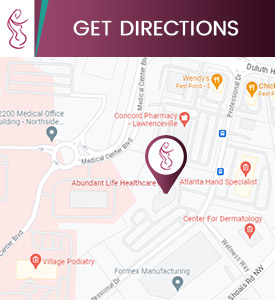Are Fibroids Normal (And What Can I Do About Them)?
A typical kind of noncancerous growth that can develop in and on your uterus is called uterine fibroids. Although not all fibroids create symptoms, when they do, such symptoms may include painful sex, frequent urination, back discomfort, and heavy menstrual bleeding. Larger fibroids can be treated with medication or surgery, but smaller fibroids frequently don’t require treatment. For more information, contact us or schedule an appointment online. We are conveniently located at 601A Professional Drive, Suite 370 Lawrenceville, GA 30046.


Fibroids are extremely common, especially in women in their 40s and 50s. You just may not know how common they are because much of the time, fibroids cause no symptoms. And, once you pass through menopause, the fibroids shrink.
In some women, however, fibroids cause symptoms that seriously disrupt life. Pelvic pain, heavy periods, rectal pressure, low back pain, frequent urination, and uncomfortable bloating are signs of fibroids. You don’t have to live with these issues. At Abundant Life Healthcare, the team can evaluate and treat your fibroids so you can resume a high quality of life.
Why are fibroids common?
Fibroids are nonmalignant growths that develop in the uterus. They range in size from nearly microscopic to the size of a grapefruit. They could even make you look a few months pregnant. Larger fibroids tend to be most uncomfortable and symptomatic.
You may develop fibroids because of age or a genetic propensity. Being overweight or obese, eating lots of red meat or processed ham, and being of African-American descent also increase your chances of having fibroids.
Researchers aren’t clear why women often develop fibroids, but it may be because of changes in estrogen and progesterone levels and genetics. When you’re pregnant, fibroids can grow rapidly as a result of the increase in hormones.
HOW ARE FIBROIDS DIAGNOSED?
Your symptoms may suggest fibroids, and Dr. Jean-Gilles may even feel one during a regular pelvic exam when he checks your uterus, ovaries, and vagina. An ultrasound, a noninvasive screening test that uses soundwaves to create a picture of your internal organs, can reveal fibroids. You may also need an MRI, X-ray, or CT scan to verify your fibroids’ presence, size, and exact location.
How can you manage fibroids?
Lifestyle changes can help with fibroids. For example, achieving a healthy weight and reducing your intake of red and processed meat are steps you can take at home to ease fibroid growth and symptoms.
You can also try over-the-counter drugs, such as ibuprofen, for any mild pain you experience with fibroids. But, if these remedies don’t help, you may need to visit Abundant Life Healthcare for help. We may first recommend an iron supplement if you have heavy menstrual bleeding. This can prevent iron-deficient anemia.
What is involved in medical management?
Certain birth control medications can help control symptoms, specifically heavy bleeding and cramping during your period. Progesterone-like injections like Depo-Provera® or the IUD Mirena® also offer hormones that help ease heavy bleeding and offer birth control.
You may be a candidate for gonadotropin-releasing hormone agonists, medications that can mimic menopause and shrink your fibroids. You may experience menopause symptoms such as hot flashes or decreased sex drive with the medications, and they can thin your bones, so you only use them for a short period – such as just before surgery to remove the fibroids. Use of the GNRHas reduces the fibroids’ size so they’re easier to isolate and remove.
Surgery may be your only recourse if you have moderate-to-severe symptoms associated with fibroids. A myomectomy removes just the fibroid and no surrounding tissue; this procedure is best for women who still want to become pregnant in the future. In some cases, a hysterectomy, the removal of the entire uterus, is the best option and cures fibroids altogether.
We may also recommend endometrial ablation during which the lining of the uterus is removed or destroyed with a laser. This minor surgery is done in-office on an outpatient basis. You cannot have children after this procedure.
If you have serious issues with fibroids, don’t just suffer in silence. Contact Abundant Life Healthcare, or book an appointment using this website to find out your options for treatment.



